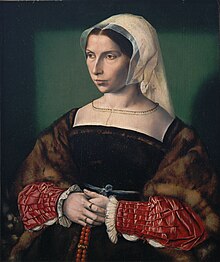Anne Stafford, Countess of Huntingdon
| Lady Anne Stafford | |
|---|---|

Anne Stafford, c. 1535, by Ambrosius Benson
|
|
| Spouse(s) | Sir Walter Herbert George Hastings, 1st Earl of Huntingdon |
|
Issue
Francis Hastings, 2nd Earl of Huntingdon
Sir Thomas Hastings Edward Hastings, 1st Baron Hastings of Loughborough Henry Hastings William Hastings Dorothy Hastings Mary Hastings Katherine Hastings |
|
| Noble family | Stafford (by birth) Huntingdon (by marriage) |
| Father | Henry Stafford, 2nd Duke of Buckingham |
| Mother | Lady Katherine Woodville |
| Born | c.1483 |
| Died | 1544 Buried at Stoke Poges, Buckinghamshire |
Anne Hastings, Countess of Huntingdon (née Lady Anne Stafford) (c. 1483–1544) was the daughter of Henry Stafford, 2nd Duke of Buckingham, and Lady Katherine Woodville. She was the wife of Sir Walter Herbert, and George Hastings, 1st Earl of Huntingdon, and served in the household of King Henry VIII's daughter, Princess Mary, the future Queen Mary I.
Born around 1483, Lady Anne Stafford was the daughter of Henry Stafford, 2nd Duke of Buckingham, and Katherine Woodville
Anne Stafford had two brothers, Edward Stafford, 3rd Duke of Buckingham, and Henry Stafford, 1st Earl of Wiltshire; and a sister, Elizabeth Stafford, Countess of Sussex.
In 1483, King Richard III executed Henry Stafford for treason. Anne's mother remarried to Jasper Tudor. In 1503, Anne married Sir Walter Herbert.
When Herbert died in 1507, Anne gave control of her jointure, which included Raglan Castle in Wales, to her brother, Edward. Anne went to live in her brother's household at Thornbury until her second marriage to George Hastings in 1509.
In 1510, Anne was the subject of a sex scandal. Her brother had heard rumours that Anne was having an affair with Sir William Compton. On one occasion, Stafford found Compton in Anne's room. Compton was forced to take the sacrament to prove that he had not committed adultery. Hastings sent Anne to live in a convent 60 miles away from the royal court. There is no evidence that Anne and Compton committed adultery. However, in 1523 Compton took the unusual step of bequeathing land to Anne in his will, and directing his executors to include her in the prayers for his kin for which he had made provision in his will.
...
Wikipedia
